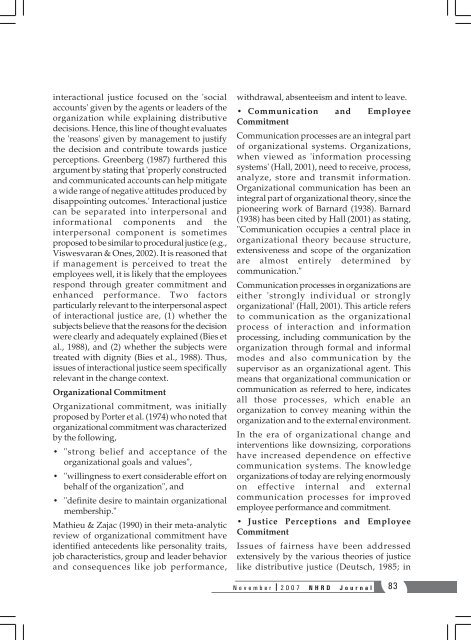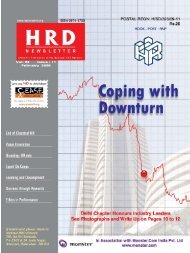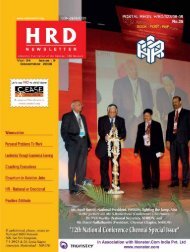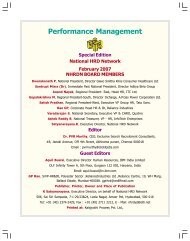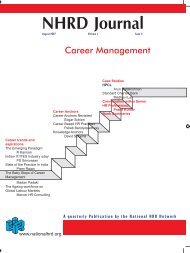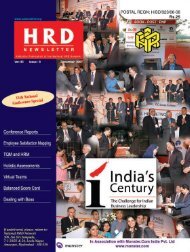NHRD Journal - National HRD Network
NHRD Journal - National HRD Network
NHRD Journal - National HRD Network
You also want an ePaper? Increase the reach of your titles
YUMPU automatically turns print PDFs into web optimized ePapers that Google loves.
interactional justice focused on the 'social<br />
accounts' given by the agents or leaders of the<br />
organization while explaining distributive<br />
decisions. Hence, this line of thought evaluates<br />
the 'reasons' given by management to justify<br />
the decision and contribute towards justice<br />
perceptions. Greenberg (1987) furthered this<br />
argument by stating that 'properly constructed<br />
and communicated accounts can help mitigate<br />
a wide range of negative attitudes produced by<br />
disappointing outcomes.' Interactional justice<br />
can be separated into interpersonal and<br />
informational components and the<br />
interpersonal component is sometimes<br />
proposed to be similar to procedural justice (e.g.,<br />
Viswesvaran & Ones, 2002). It is reasoned that<br />
if management is perceived to treat the<br />
employees well, it is likely that the employees<br />
respond through greater commitment and<br />
enhanced performance. Two factors<br />
particularly relevant to the interpersonal aspect<br />
of interactional justice are, (1) whether the<br />
subjects believe that the reasons for the decision<br />
were clearly and adequately explained (Bies et<br />
al., 1988), and (2) whether the subjects were<br />
treated with dignity (Bies et al., 1988). Thus,<br />
issues of interactional justice seem specifically<br />
relevant in the change context.<br />
Organizational Commitment<br />
Organizational commitment, was initially<br />
proposed by Porter et al. (1974) who noted that<br />
organizational commitment was characterized<br />
by the following,<br />
• "strong belief and acceptance of the<br />
organizational goals and values",<br />
• "willingness to exert considerable effort on<br />
behalf of the organization", and<br />
• "definite desire to maintain organizational<br />
membership."<br />
Mathieu & Zajac (1990) in their meta-analytic<br />
review of organizational commitment have<br />
identified antecedents like personality traits,<br />
job characteristics, group and leader behavior<br />
and consequences like job performance,<br />
withdrawal, absenteeism and intent to leave.<br />
• Communication and Employee<br />
Commitment<br />
Communication processes are an integral part<br />
of organizational systems. Organizations,<br />
when viewed as 'information processing<br />
systems' (Hall, 2001), need to receive, process,<br />
analyze, store and transmit information.<br />
Organizational communication has been an<br />
integral part of organizational theory, since the<br />
pioneering work of Barnard (1938). Barnard<br />
(1938) has been cited by Hall (2001) as stating,<br />
"Communication occupies a central place in<br />
organizational theory because structure,<br />
extensiveness and scope of the organization<br />
are almost entirely determined by<br />
communication."<br />
Communication processes in organizations are<br />
either 'strongly individual or strongly<br />
organizational' (Hall, 2001). This article refers<br />
to communication as the organizational<br />
process of interaction and information<br />
processing, including communication by the<br />
organization through formal and informal<br />
modes and also communication by the<br />
supervisor as an organizational agent. This<br />
means that organizational communication or<br />
communication as referred to here, indicates<br />
all those processes, which enable an<br />
organization to convey meaning within the<br />
organization and to the external environment.<br />
In the era of organizational change and<br />
interventions like downsizing, corporations<br />
have increased dependence on effective<br />
communication systems. The knowledge<br />
organizations of today are relying enormously<br />
on effective internal and external<br />
communication processes for improved<br />
employee performance and commitment.<br />
• Justice Perceptions and Employee<br />
Commitment<br />
Issues of fairness have been addressed<br />
extensively by the various theories of justice<br />
like distributive justice (Deutsch, 1985; in<br />
November 2007 <strong>N<strong>HRD</strong></strong> <strong>Journal</strong> 83


